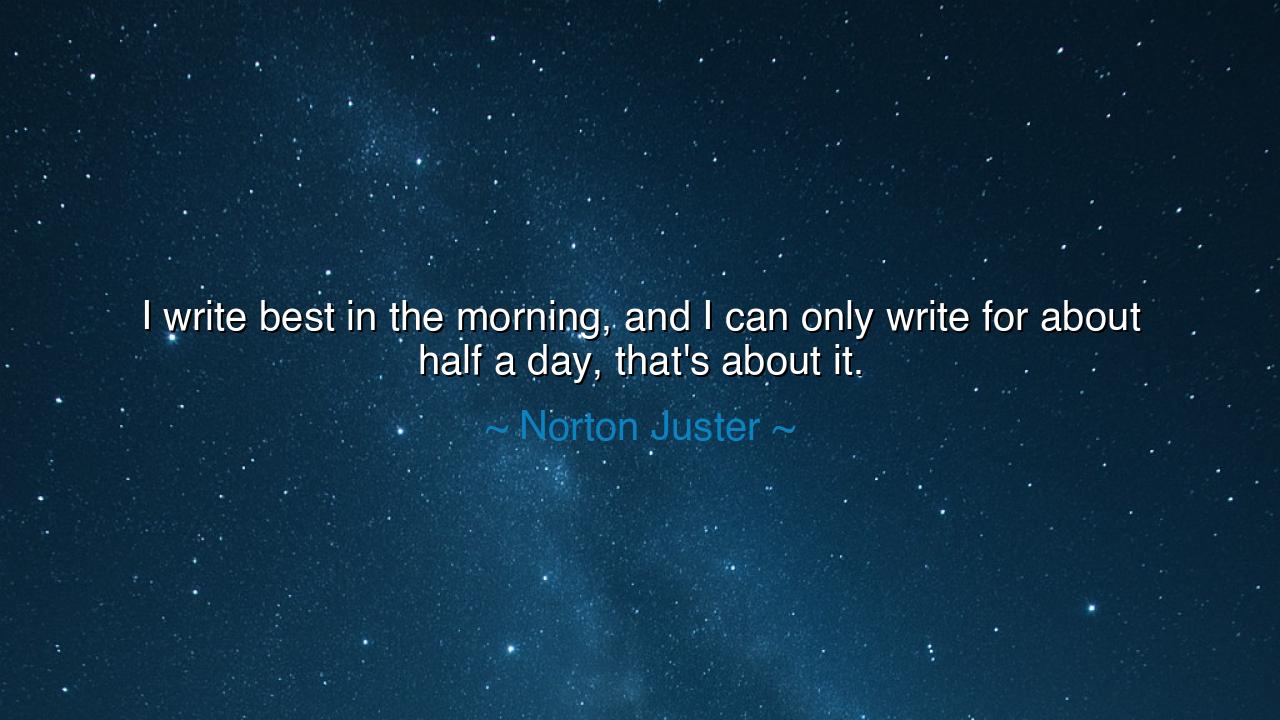
I write best in the morning, and I can only write for about half
I write best in the morning, and I can only write for about half a day, that's about it.






In the early light of dawn, before the world stirs, there exists a quiet space where the mind is most alive, most clear. It is a time untouched by the distractions of the day, where ideas flow freely, and creativity finds its purest form. Norton Juster, a man who crafted words with the same ease that the wind shapes the leaves, spoke of this sacred hour when he said, “I write best in the morning, and I can only write for about half a day, that’s about it.” These words, simple yet profound, carry within them a deep understanding of the human condition—the recognition that our energy and focus are not infinite, but are instead tied to the rhythm of the day, to the cycles that govern all life.
In the dawning light of morning, our spirits are untainted by the weight of the day’s toil. The ancients knew well the importance of this time. The Greeks, in their pursuit of wisdom, would often rise with the sun, for they believed that the early hours were when the mind was closest to the divine. It is in this early stillness that true insight can be found, when the world is still, and we are most attuned to our inner thoughts. Juster’s recognition of this time as the most productive speaks not only to his own process, but to a timeless truth about human nature—that there are moments in the cycle of the day when we are at our peak, and it is in honoring these moments that we can achieve our greatest work.
But Juster’s words also reveal something deeper—an understanding of the limits of our own energy and focus. The wisdom of the ancients tells us that even the strongest warriors must rest, and even the most brilliant minds must pause. The concept of balance, of understanding when to push forward and when to step back, has been present in the teachings of great philosophers, from Confucius to Aristotle. They recognized that to live in harmony with the world, we must honor our own rhythms, our own natural cycles. For Juster, the limit of half a day was not a weakness, but a sign of wisdom—a recognition that to force oneself beyond one’s natural capacity is to sacrifice quality for quantity.
Let us look to history for further evidence of this timeless wisdom. Thomas Edison, the great inventor, was known to work tirelessly, but he also knew the importance of rest. He would take short naps throughout the day to recharge his mind, understanding that only through such rest could he continue his work with clarity and innovation. Just as Edison honored his own rhythms, so too did Juster recognize the power of limitation. In the same way, the greatest warriors of old understood that they could not fight forever without rest, nor could they perform their greatest feats without preparing their minds and bodies for battle.
In our own lives, there is much to be learned from this simple truth: to know one’s limits is not a sign of weakness, but a mark of wisdom. To push oneself beyond the point of exhaustion is to lose the quality of the work, to lose the clarity of thought. By recognizing the times when we are at our peak, and by respecting our need for rest, we align ourselves with the natural rhythms of the world. This is not a call to laziness or idleness, but a call to understand that productivity and creativity are best nurtured when we honor our own limitations. If we give ourselves the time to recharge, to rest, and to reflect, we come back to our work with renewed energy, clarity, and purpose.
The lesson here is clear: listen to the rhythms of your own life, for they hold the key to your most fruitful and creative work. Know the times when you are most alive, most focused, and embrace them. Just as the early morning hours are sacred for some, others may find their strength at different times of day. But in recognizing these moments and working with them, we can achieve our greatest successes. So, let us not fight against our natural rhythms, but instead, let us honor them, and in doing so, create work that is as meaningful as it is enduring.






AAdministratorAdministrator
Welcome, honored guests. Please leave a comment, we will respond soon